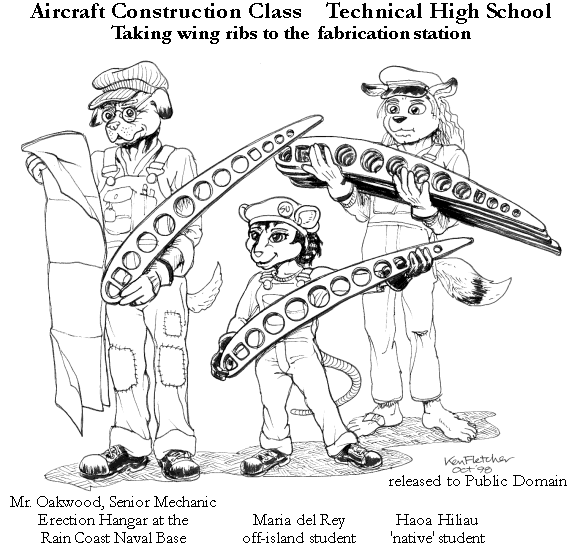Spontoon Island
home
- contact - credits
- new - links -
history
- maps - art - story
comic
strips - editorial - souvenirs - Yahoo forum
Text Information on this page is granted to Public Domain
Compiled by Ken Fletcher
Schools and Vocational Training

Public education is open to all on the Spontoon Islands, costs
supported
by taxes and fees paid to the Althing administration. Officially,
Spontoonie
schools,
Euro schools, and private schools are all separate systems. In
practice,
students may be able to take unique classes in another system.
The high schools are smaller than big city size, and class sizes tend
to be small.
Elementary schools are located in local villages, usually close to
the village athletic fields and Althing halls. Upper grades (8th year
and above)
are held at the Meeting Island High School or at the Technical High
School
on Moon Island. The Euro population on Casino Island has their own
elementary
school and high school. There are actually many students who take
courses
at more than one of the high schools, or transfer between schools.
Many students from other Pacific Islands apply for a Spontoon Island
scholarship
because of the value of the technical education.
Commuting can be difficult for students, and many board near the
schools
at Student Union longhouses during the school week or during the school
term.
There are 11 student or staff school unions, all very volatile.
There are secret Althing schools, which will not be discussed here.
There are also small business schools, apprentice programs and private
academies,
the most well-known being Songmark Academy.
Spontoon Island Cooperative
High
School
(Meeting Island High School)
The main High School building is located on Meeting Island near the
Althing administrative buildings
and uses Co-op committee auditorium and gymnasium buildings. The
buildings
were
all built in the early 20s, and are ugly and brutal utilitarian in
design, but are becoming vine-covered
and screened by bushes and trees. Inside you find comfortable halls
and classrooms.
Lots of garden flowerbeds and short trees grow around the campus. Paths
go everywhichway.
General Education, social skills, world geography, science and arts
are taught. Basics for
all students and advanced classes for those who want them. However,
there are some students
who plan to specialize in Advanced Island Subsistence Living. They can
get instruction in Reef Fishing
and Tourist Basket Weaving, for example. Adults are welcome to come
back and expand their education.
Classroom instruction can tie into apprenticeship or mentors for small
groups of students
or individual students. Classes may be off-campus, or outdoors.
Students
commute by
bustruck, train, watertaxi, canoe, bicycle, and walk. Many live at
the student-coop longhouses on
Meeting Island or nearby in villages on the Main Island. Some of the
co-ops are calm places to study.
The Meeting Island High School is administered by a committee of the
Althing
that includes several community subcommittees and union representation
from
the parent's unions, the teacher's unions, and the student's unions.
It is said that
the world's best committee wonks trained on the Meeting Island High
School Committee!
There can be outbursts of negotiation turmoil, especially with the
student unionists still
learning their co-op skills. Even so, student subcommittees are more
likely to make Friday's lunch
than oppose Friday's lunch. High school classrooms can be surprisingly
calm, unless you count
the visual anarchy of the poster walls.

Spontoon Island Technical
High
School
Located on Moon Island at the Rain Coast Naval Syndicate military base,
with classes and administration in leased and converted barracks and
classrooms.
Classes may also be held off-site in machine shops and repair
facilities.
Those students choosing a career in aviation get training in mechanics,
navigation,
and piloting. Other general business and technical schooling is
available.
Classes tie-in directly to apprentice programs run by the Rain Island
Naval Syndicate (and its subcontractors) and some of the aviation
businesses.
This tech school is administered by a committee of the Althing and
is funded by lease income, business taxes, and tuitions from off-island
students.
Natives (1/2 the students) with acceptable grades are tuition-free.
Euro exchange students from the Casino Island High School (1/4 the
students)
pay a tuition fee that is usually offset by scholarships from the
Althing
or businesses.
Off-island students (1/4) pay tuition with some scholarships available.
The training and setting attract many off-island applications.
Most of the students choose to live in the "longhouses" adjacent to
the school.
Run by student union committees, these are energetic but not rowdy.
Casino Island Cooperative
High
School
Located on the north side of Casino Island overlooking Student Bay.
This modern style new building (1931) built with the help of Casino
funds, replaces a cluster of wooden buildings on the same location.
Charming and scenic site, with buildings tucked into the slopes
around the bay. Noted for the distracting views from the classrooms
of the Main Island and water traffic in the lagoon. Closest to a
typical
1930s
North American or British school in classes offered and social classes
encountered.
Most of the students are from Euro (non-Spontoonie) families living
on Casino Island, Moon Island, or Eastern Island. There are school
boats
for the commuting students, including one around Casino Island.
The school is administered by a school board elected by the Euro
population,
and is pretty much left to itself to get funding and plan
instruction.
There is some
co-operation between the Euro School Board and the Althing Education
Committees.
There is also a tradition of rivalry with the Althing schools and
internal
factional fighting
about education goals. Funding comes from school board levies on the
Euro-leased land,
business donations, and fees from the Casino. The Althing does provide
some subsidies.
The Euro schools had been tuition-supported "private" schools until
1915, and shifted
to tax based "public" schools by 1920. The "cooperative" name and some
traditions
come from that time of change. There have been attempts to install
a more Libertarian
style of education system, but during the 1930s this mostly shows up
in subsidized
courses by local businesses. Some of the well-off Euro community have
private
tutors for their younger children, or use some small private academies.
Songmark Aeronautical
Boarding
School
for Young Ladies (Songmark
Academy)
Internationally known as a finishing school for young women
who are determined to be self-sufficient adventuresses, or at the
least,
knowledgeable aviatrixes prepared to navigate this modern world.
Their exasperated and confused well-to-do families may be
reassured by the sophisticated survival training provided.
New students are 19 years old or older, and board at
the school campus on Eastern Island. Some facilities
are leased from local businesses and institutions.
Founded in 1930 by 5 internationally notorious
women aviators.
SNAPSHOTS FROM SONGMARK ACADEMY:
Keeping our modern daughters out of
mischief
Academy students under Staff supervision
Songmark students assist community
firefighters
Surfing contest goes on with assist of
Lord Whitehead
Amelia Bourne-Phipps was a student at Songmark Academy in the
mid-1930s.
Extracts from her diaries (compiled by Simon Leo Barber) can be found
on the "Story" webpage.
Dance Schools
The many dance schools can be a part of young people's education, but
are separate from the formal school administrations. These started
out as schools
of the Spontoonie "Culture", but are now as likely to be social clubs
that also do
dance instruction and host dance events and other coop entertainments.
A dance school may be invited by a committee to organize student dance
instruction
or a dance school may lease or barter for dancing rooms at a school
building.
While most of the dance schools have open memberships, some are
invitational.
Many are open to Euros, some to tourists. Some are coops and some
are now run as businesses.
Pictures from the dance schools are in the "Art" pages.
Althing Secret Schools
The small secret schools to train selected young people in spy crafts
and information gathering arts will not be discussed at this time.
I can say that "Advanced Arts & Crafts" and "Advanced Geography"
have different meanings on Spontoon Island than elsewhere.
Spontoonie entertainers and hospitality workers are
known throughout the Pacific for their charm and sophistication.
They are considered surprisingly well educated.